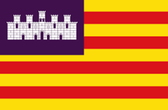
Call 0330 880 3600 Calls may be monitored or recorded. Opening Times.
- TRAVEL INSURANCE
- MEDICAL CONDITIONS
- More Options
- Help & Advice
- Existing Customers

Call 0330 880 3600 Calls may be monitored or recorded. Opening Times.

Need help?
UK Customer Services0330 880 3600*
Open Monday to Friday 9:00am to 6pm, Saturday 8:30am to 4pm and closed Sundays.
*Calls are recorded for training and quality purposes.

Official name: Balearic Islands (Illes Balears)
Capital city: Palma de Mallorca
Official language: Catalan and Spanish
Population: Around 1.2 million
Currency: Euro (EUR)
Time zone: GMT+1
Driving side: Right
Climate: Mediterranean - hot, dry summers and mild, wetter winters
The Balearics - Mallorca, Menorca, Ibiza and Formentera - sit in the western Mediterranean off Spain’s east coast. Each island offers something different: Palma’s Gothic architecture, Menorca’s relaxed pace, Ibiza’s legendary nightlife, and Formentera’s pristine sands. They share turquoise waters, pine hills and a well-oiled tourism scene, but each delivers its own unique flavour.
This limestone archipelago combines headlands, farmland and low- to mid-level mountains. Mallorca is the largest, with the Serra de Tramuntana in the northwest; Menorca is greener and gentler; Ibiza more rolling; Formentera flat and compact. Expect hot summers, occasional winter storms, and a small risk of flash flooding after heavy rain. Wildfires are possible in peak summer - follow local guidance.
Airports at Palma (PMI), Ibiza (IBZ) and Menorca (MAH) connect widely across Europe. Ferries link the islands with each other and with mainland ports such as Barcelona and Valencia. Roads are generally good, and public transport is best on Mallorca (buses, metro, and trains near Palma), moderate on Ibiza and Menorca, and limited on Formentera, where scooters and bicycles are popular. Formentera also has seasonal vehicle quotas and parking restrictions, so book in advance if bringing a car. Petty theft can occur around nightlife hotspots and busy beaches — stay alert, especially late at night.
As part of Spain (Schengen Area), UK nationals can enter visa-free for up to 90 days in any 180-day period. Passports must generally have been issued within the last 10 years and be valid for at least 3 months after departure. EU/EEA/Swiss citizens may enter with a national ID card. Other travellers should check Schengen entry requirements.
The euro (EUR) is standard. Cards and contactless payments are widely used, though small beach bars or rural businesses may prefer cash. ATMs are widely available. A Sustainable Tourism Tax applies per person, per night (children under 16 exempt), with lower rates after the ninth night and in low season (Nov–Apr).
Healthcare is good in Palma, Mahón and Ibiza Town, though facilities are more limited on smaller islands. UK travellers should carry a GHIC/EHIC for medically necessary state care, but it does not replace travel insurance. Routine vaccinations should be up to date, and hepatitis A/typhoid may be advised depending on your itinerary. In summer, guard against sun and heat, stay hydrated, and check beach flags for jellyfish warnings. Tiger mosquitos are common, though disease risk is low.